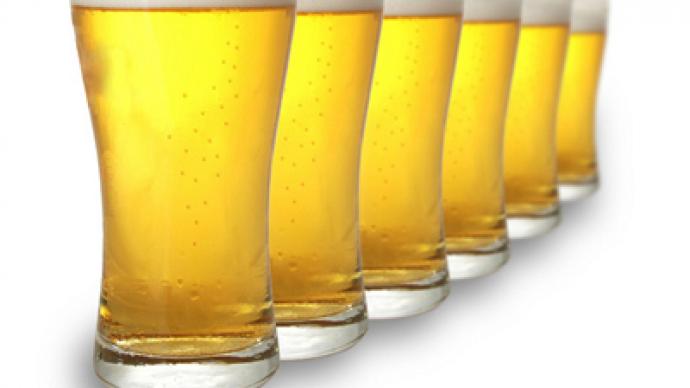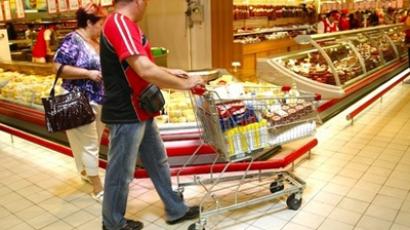2010 excise hikes and grain prices leave beer drinkers looking for change

The Russian brewing industry is pointing to an excise tax increase which prompted a demand slowdown to explain a production drop during 2010.
The rate of excise duty on beer was increased by 200% to reach 9 roubles per litre, replacing heavy alcohol at the top of the excise range. That came on top of rising costs as Russia’s barley crop was decimated by the drought. According to Baltica the 2010 increase in excise tax corresponded with a 4% decline in beer market volumes.Alexei Kedrin, Director of Corporate Communications and Information, OJSC Baltika says the volume of sales fell as soon as news on tax increase leaked on the market. “Sales volumes across the company's products, including sales of non-beer categories, and sales abroad, decreased by 12% in 2010 compared with 2009. Sales volumes of beer in Russia decreased by 13% and were due to stockpiling by distributors in the 4th quarter of 2009 in anticipation of rising excise taxes. At the same time, distributors sales in retail outlets fell by 4% compared to 2009.”According to the Russian Brewers' Union, the yield of barley in Russia in 2010 amounted to only 8.4 million tones, 54% less than in 2009 with the harvest downturn extending for 2 years. To avoid crop shortages, Russian companies substantially increased imports of malting barley and malt in the second half of 2010. Traditionally, barley cultures are imported mainly from Finland and Germany. However, Germany faced similar problems with bad harvest which resulted in a substantial increase in commodity prices in late 2010. Vladimir Efremov, director of sales Ochakovo says despite disappointing production results Ochakovo has a significant advantage to protect against further production declines in the form of its own secure crops.“The production of Ochakovo beer decreased by 8.2% in 2010 on the back of excise tax increase from 3 roubles up to 9 roubles per liter. However, we are independent from country volume of harvest as we produce and cultivate our own corps of barley and have independent resource base so the price for the Ochakovo products will change only within the general rate of inflation in the country. Moreover, in 2011 we plan to increase production by 3-5%.”Kedrin from Baltika also pointed to crop failure as a factor in trimmed Full Year 2010 profits.“The production cost decreased significantly in 2010 compared with 2009 as prices for barley have reached their lowest level in the last four years. Adverse weather conditions in summer 2010 led to bad harvest and skyrocketing prices on barley at the end of 2010 which affected company profits and added 25% to a retail price of product”Efremov notes that despite the impact of the tax excise demand rebound in coming years.“Changing the rate of excise duty is the most significant factor that has influenced the production and consumption of beer in 2010, but according to our forecasts, the demand will recover gradually, as consumption of beer in Russia lags 30-40% behind the European average.”Whereas the beer production slumped Baltika’s Alexei Kedrin noted vodka and wine production grew by 3.7% and 14.5% respectively in 2010. He says this means weaker alcohol products are being replaced by stronger alcohol.“While the global trend focused on substitution of strong spirits with low alcohol beverages the local tax increase of 200% on beer is incomparable with only 10% increase on strong spirits – this is a step in the opposite direction. We assume that as a result of triple increase of the excise tax on beer and as a consequence, a significant increase in retail prices for beer consumers may switch to more affordable spirits.”Efremov agrees that the consumer patterns might be affected due to robust law enforcement. “Decreasing beer industry production inevitably leads to growth in the vodka market. Vodka producers are the major initiators of the reform and put pressure on government officials to push an anti-alcohol campaign, resulting in controversy and ineffective outcome. The portfolio of our company has several licensed brands Kaltenberg, Altstein, these brands remain a positive trend in consumption, despite the overall decline in production, meaning price is not a dominating factor for premium brands. Therefore, in 2011 we are planning to offer several new licensed brands of beer for consumers. But it should be noted that the average consumer has become thrifty. Those who switched to spirits were driven by comparatively low retail price of vodka.”Kedrin agrees that apart from price hikes, the economic slowdown impact consumer sentiment. “Until the second half of 2010 the turn around tendency has been observed with more consumers switching to cheaper brands of beer and packaging increasing importance of modern trade channel. Nevertheless, the statistics for the second half of 2010 indicates a gradual return of consumers to more premium products and usual standards of consumption.”Kedrin says Russian brewers had no other chance to retain production levels, except to push marketing expenditures.“The company managed to moderate the impact of substantial increase in excise tax on sales through the implementation of pricing strategy of gradual price increases during the year, as well as due to the recovery of the market in the second half of 2010. The company's financial results reflect lower sales volumes. Nevertheless, despite the overall decline, marketing expenditures were increased and the company managed to maintain profitability.” Efremov said consumer focus helped company to save customer loyalty avoiding quality reduction. “First, we optimized the internal business processes and logistics, in addition, to maintain prices at a certain psychological level, we launched a new packaging of 1 litre and 2 litre bottles. Thus, our customer can choose the optimal amount of products at attractive prices. The only thing on which we never reduce expenses is the quality of raw materials and production technology.”














